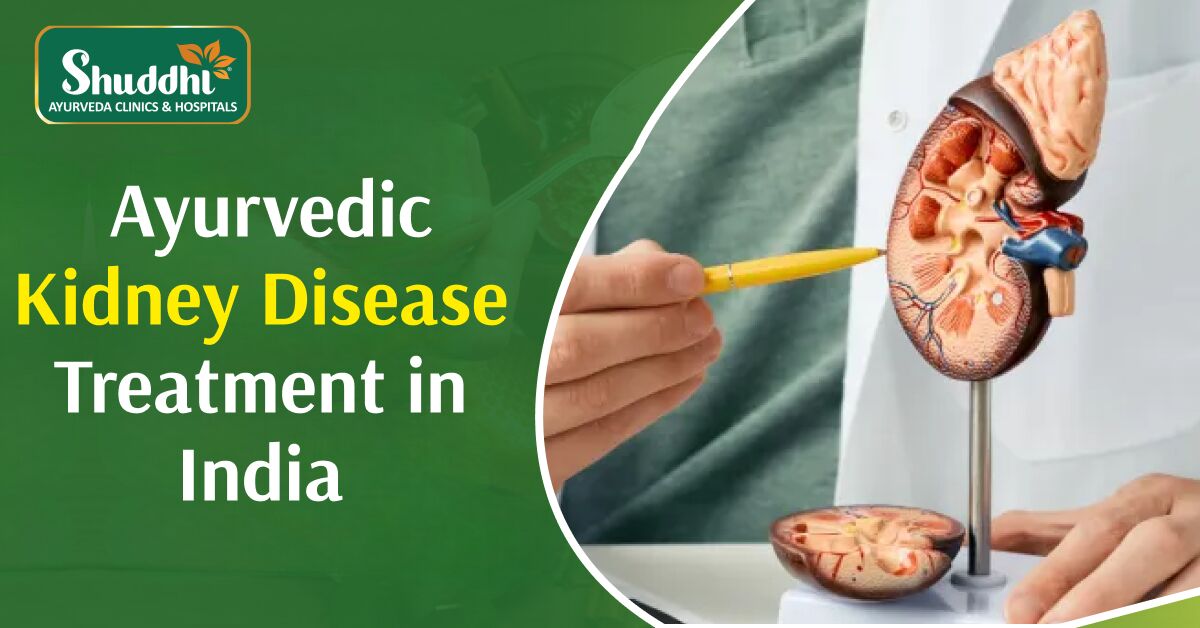No products in the cart.
Ayurveda vs Allopathy: Which Controls Diabetes Naturally?
12 November 2025

Millions of people in India suffer from kidney disease, which frequently results in long-term consequences. Dialysis and transplants are standard remedies offered by allopathic treatment, but many people are now choosing Ayurvedic Kidney Disease Treatment since it is more complete, non-invasive, and long-lasting. Through natural therapies and lifestyle modifications, Ayurveda, which has its roots in centuries-old practices, not only treats the symptoms of kidney problems but also addresses their root causes.
Table of Contents
ToggleOne of the top Ayurvedic medical facilities, Hiims, provides a thorough, personalised approach to kidney care. Their ayurvedic kidney care approach blends traditional treatments with innovative therapeutic technology. They aid in the natural restoration of kidney function in the following ways:
One of the basic Ayurvedic treatments, panchakarma, aims to purify the body at the cellular level. This treatment is essential for those with kidney diseases because it rids the body of ama (toxins), which are thought to be one of the main causes of kidney damage. The benefits of this Ayurvedic cleanse include:
It helps reverse early-stage kidney damage and is a fundamental component of Ayurvedic Kidney Disease Treatment.
The GRAD system at Hiims is a special detoxifying approach that combines physical stimulation methods, hot water immersion, and head-down tilt therapy. These aid in removing toxins from the body and re-establishing the kidneys’ blood flow.
These Ayurvedic therapies provide a natural kidney disorders remedy, promoting long-term healing without the side effects of conventional medications.
Zero Volt Therapy, sometimes referred to as earthing therapy, is a method of re-establishing a connection with the inherent energy of the Earth by going barefoot on grass or soil. This treatment:
It’s a simple but improve kidney health naturally.
At , the DIP (Disciplined & Intelligent Person’s) Diet is a fundamental component of the Ayurvedic treatment. This plant-based diet, which is designed for kidney sufferers, consists of foods that are low in salt, high in fibre, and antioxidants:
This dietary strategy encourages a quicker recovery and is completely compatible with Ayurvedic treatment for the kidneys.
Many herbal remedies are offered in Ayurveda to promote kidney function and bring about balance. Among the potent plants utilised at Hiims are:
These herbs are chosen with care and tailored to each patient to provide a successful treatment for kidney problems.
Patients who choose Ayurvedic treatment for kidney disease benefit from several advantages:
Hiims makes certain that every treatment is carefully planned to optimise outcomes by applying the principles of ayurvedic kidney care.
Prevention is crucial, according to Ayurvedic tradition, even if you do not currently have a kidney disease diagnosis. The experts at Hiims have provided the following advice to preserve kidney health:
Drink plenty of water: Avoid becoming overly hydrated, but drink enough water.
Consume Plant-Based Foods: Emphasise whole grains, fruits, and vegetables.
Avoid processed foods and alcohol: These slow healing and strain the kidneys.
Get Regular Exercise: Keep your weight in check and lower your blood pressure.
Regular Examinations: Periodically check kidney health to identify any early indicators.
You can lower your risk of developing chronic kidney disease and enhance kidney health naturally by adopting these habits.
For people with renal problems, opting for Ayurvedic Kidney Disease Treatment in India gives healing and hope. With treatments like Panchakarma, the GRAD System, the DIP Diet, and herbal medicine, Hiims offers kidney care that is comprehensive, long-lasting, and free of side effects. Ayurveda provides proven techniques that enable the body to heal itself, whether you’re looking for a natural kidney disorder remedy or just want to enhance kidney health.
1. What is the treatment of kidney disease with Ayurveda?
It’s a non-invasive, natural method of re-establishing kidney health that includes food, detox treatments, and herbs.
2. Can Ayurveda reverse chronic kidney illness?
By addressing the underlying cause, Ayurveda seeks to control and possibly even reverse early-stage kidney disease.
3. Is it safe to combine Ayurvedic and allopathic medicine?
When used under a doctor’s supervision, Ayurvedic treatments can frequently supplement allopathic treatment.
4. When using Ayurvedic kidney care, how long does it take to notice results?
Although outcomes differ, many individuals experience improvements after receiving regular treatment for a few weeks to months.
5. Which foods are suggested for renal illness treatment in Ayurveda?
Following a plant-based, low-sodium, antioxidant-rich diet, such as the DIP Diet, is usually advised.

With our VOPD service, you can talk and consult with our doctors at the comfort of your home
Shop online from a wide range of ayurvedic products.
We have 22+ Panchakarma Centres where you can visit & take benefit of Panchkarma therapies
We have 52+ Shuddhi Clinics all over India where you can visit for all your health concerns.
We have 45+ hospitals in different locations in India. We have hospitals in Meerut, Derabassi, Lucknow, Navi Mumbai. We are coming up with many more hospitals to take the right and effective treatment across India.
All our products are delivered on time. We strive to ensure the best and timely service to our patients.
Guru Manish Ji founded Shuddhi for one purpose only i.e, to give a disease-free life to all. He believes that with the help of Ayurveda & Naturopathy balancing all three doshas, one can get rid of any health issue. As an Ayurveda & Naturopathy Guru & Ambassador Manish Ji emphasizes a lifestyle that revolves around a healthy lifestyle, balanced diet, Yoga, and Meditation.
read more© Shuddhi, All Right Reserved.
